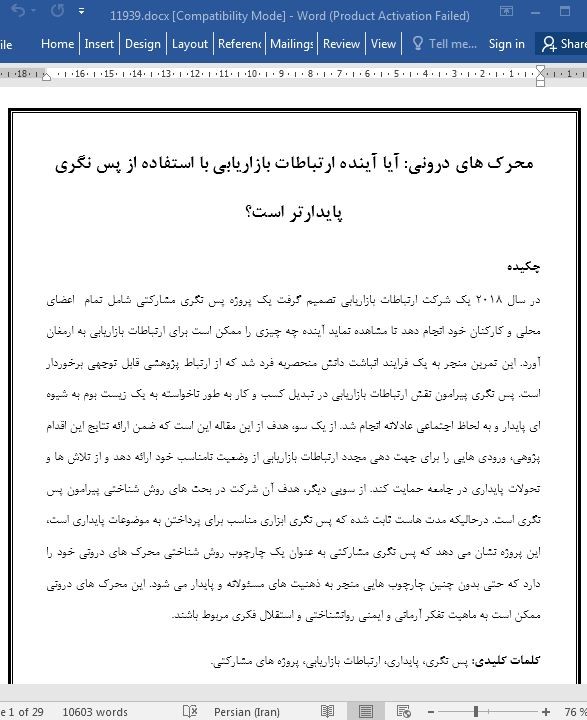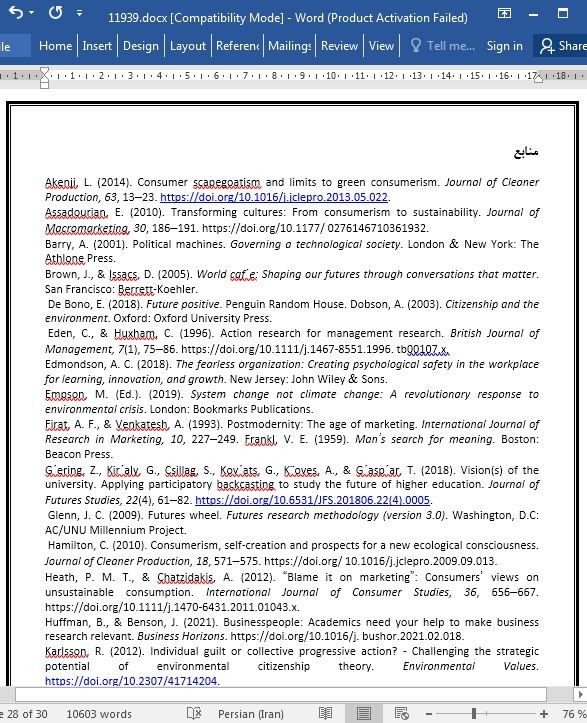
محرک های درونی: آیا آینده ارتباطات بازاریابی با استفاده از پس نگری پایدارتر است؟
چکیده
در سال 2018 یک شرکت ارتباطات بازاریابی تصمیم گرفت یک پروژه پس نگری مشارکتی شامل تمام اعضای محلی و کارکنان خود انجام دهد تا مشاهده نماید آینده چه چیزی را ممکن است برای ارتباطات بازاریابی به ارمغان آورد. این تمرین منجر به یک فرایند انباشت دانش منحصربه فرد شد که از ارتباط پژوهشی قابل توجهی برخوردار است. پس نگری پیرامون نقش ارتباطات بازاریابی در تبدیل کسب و کار به طور ناخواسته به یک زیست بوم به شیوه ای پایدار و به لحاظ اجتماعی عادلانه انجام شد. از یک سو، هدف از این مقاله این است که ضمن ارائه نتایج این اقدام پژوهی، ورودی هایی را برای جهت دهی مجدد ارتباطات بازاریابی از وضعیت نامناسب خود ارائه دهد و از تلاش ها و تحولات پایداری در جامعه حمایت کند. از سویی دیگر، هدف آن شرکت در بحث های روش شناختی پیرامون پس نگری است. درحالیکه مدت هاست ثابت شده که پس نگری ابزاری مناسب برای پرداختن به موضوعات پایداری است، این پروژه نشان می دهد که پس نگری مشارکتی به عنوان یک چارچوب روش شناختی محرک های درونی خود را دارد که حتی بدون چنین چارچوب هایی منجر به ذهنیت های مسئولانه و پایدار می شود. این محرک های درونی ممکن است به ماهیت تفکر آرمانی و ایمنی روانشناختی و استقلال فکری مربوط باشند.
1. مقدمه
در حوزه های علمی هیچ بحثی نیست که پایداری و الگوهای فعلی مصرف در طولانی مدت سازگار نباشند. نیازها، خواسته ها، تمایلات باید مجدد تعیین شوند و باید روشی بیابیم تا شیوه زندگی شخصی خود را با موانع اکولوژیکی و برابری اجتماعی وفق دهیم. از این استدلال، ممکن است به آسانی به نظر رسد که صنعت ارتباطات بازاریابی در شکل فعلی خود، اگر نمی خواهد گناه را برای تباهی کره زمین و به دام انداختن بشریت برعهده گیرد، باید خود را مجدد بسازد. با این وجود، حتی اگر اعتصاب های اقلیمی درحال افزایش باشد و شهرها بیشتر و بیشتر حتی پیش از کووید 19 وضعیت بحران اقلیمی را اعلام کنند، به نظر می رسد که صنعت بازاریابی با خوشحالی انگیزه جامعه مصرف کننده را حفظ می نماید.
Abstract
In 2018 a marketing communications firm decided to do a participatory backcasting project involving all their local members of staff to see what the future might bring in marketing communications. The exercise led to a unique knowledge accumulation process that has substantial research relevance. Unintentionally, this backcasting revolved around the role of marketing communications in transforming business to an ecologically sustainable and socially just modus operandi. While presenting the results of this action research, on the one hand this paper aims to provide inputs to reorienting marketing communications from its undignified status in sustainability efforts to something that supports sustainability transitions in society. On the other hand, it aims to contribute to the methodological discourses on backcasting. While it has been long established that backcasting is an adequate tool to address sustainability issues, this project suggests that participatory backcasting as a methodological framework has its own inner drives that lead to responsible and sustainable mind-sets even without such framings. These inner drives may have to do with the nature of utopian thinking, and the psychological safety and intellectual independence it provides.
1. Introduction
In scientific circles it is no longer debated that sustainability and the current patterns of consumption are not compatible in the long run. Needs, wants, desires are ought to be reassessed and we must find a way to reconcile our own way of living with ecological barriers and social justice. From this argument, it may seem straightforward that the marketing communications industry in its current form needs to reinvent itself if it does not want to take the blame for ruining the planet and taking humankind down with it. Nonetheless, even if climate strikes were on the rise and more and more cities declared a state of climate crisis even before COVID-19, the marketing industry seemed to be happily maintaining the impetus of the consumer society.
چکیده
1. مقدمه
2. چارچوب چند روشی کاربردی پس نگری
3. عناصر آینده ترسیمی ارتباطات بازاریابی
3.1. تجزیه و تحلیل داده های نتایج پروژه
3.2. تصاویر
4. مقایسه نتایج با بحث های دانشگاهی
5. بحث: محرک های درونی پس نگری
5.1. محرک درونی تفکر آرمان شهر
5.2. محرک درونی امنیت روانی
5.3. محرک درونی استقلال فکری: نظریه در عمل – نظریه در علم
6. نتایج
سپاسگزاری ها
منابع
Abstract
1. Introduction
2. Applied multi-methods backcasting framework
3. Elements of the envisioned future of marketing communications
3.1. Data analysis of the project outputs
3.2. Vignettes
4. Comparing the results to the academic discourses
5. Discussion: the inner drives of backcasting
5.1. The inner drive of utopian thinking
5.2. The inner drive of psychological safety
5.3. The inner drive of intellectual independence: Theory in practice – theory in science
6. Conclusions
Acknowledgements
References
- اصل مقاله انگلیسی با فرمت ورد (word) با قابلیت ویرایش
- ترجمه فارسی مقاله با فرمت ورد (word) با قابلیت ویرایش، بدون آرم سایت ای ترجمه
- ترجمه فارسی مقاله با فرمت pdf، بدون آرم سایت ای ترجمه



